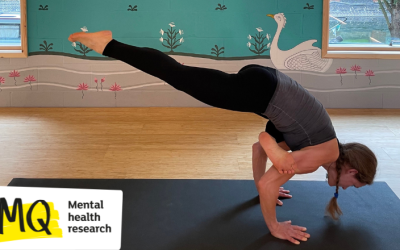This Mental Health Awareness Week 2024, the theme is Movement for Mental Health. In this article, MQ staff member Juliette Burton (pictured above) explains why her mental health lived experience has led to her movement – running to raise money for mental health...
Obsessive Compulsive Disorder (OCD)
1 in 100
people are affected by OCD
50%
of people with OCD fall into the ‘severe’ category
89 pence
is spent on research each year for every person affected in the UK
Related Conditions:
What is Obsessive Compulsive Disorder (OCD)?
Obsessive-Compulsive Disorder is a common mental health condition that typically starts in early adulthood, and is commonly known as OCD. OCD consists of obsessions (intense, uncontrollable, reoccurring thoughts, images, and fears) and compulsions (repetitive activities) that people do to relieve the obsessive thoughts.
What are the signs and symptoms?
OCD is comprised of obsessions and compulsions although the patterns of thoughts and behaviour differs between people.
Signs of obsessions
Fear of causing or failing to prevent harm
Worrying that they or someone else may get harmed or they have already been harmed.
Intrusive thoughts, images and impulses
People here may experience unwanted forbidden or taboo thoughts related to aggression, sexual or religious subjects. For example, thoughts that they might be a dangerous person, thoughts against their religion, or intrusive sexual thoughts related to children and family members.
Fear of contamination
As some people may fear contamination through germs and dirt, they may avoid situations such as touching objects or shaking hands.
Fears of worries related to order and symmetry
A compulsion to ensure everything feels 'just right'. People may find themselves working on cleaning assiduously to make sure everything is spotless.
Signs of compulsion
Rituals
Rituals are a set pattern of behaviours with a clear starting and end point. Examples of rituals include touching things in a particular order or at a certain time and arranging things in a certain way. If these rituals get interrupted, they may feel the need to start again.
Checking
People with OCD may have a compulsion to keep checking things such as locks, security systems, or ovens. Checking their body for contamination or making sure that intrusive thoughts did not happen. The constant need for checking can disrupt everyday tasks such as attending appointments and can impact their relationships.
Correcting thoughts
Correcting thoughts may consist of replacing intrusive thoughts with another image, repeating phrases in their head, repeatedly counting to a particular number.
Reassurance
People with OCD may have the constant need to ask others to reassure them that everything is alright.
What are the causes of Obsessive Compulsive Disorder?
Though there are no clear reasons, researchers believe there are several theories as to how OCD can develop. As with many mental health conditions, OCD is likely to be caused by a combination of factors. These include:
Brain function
Researchers have shown that people with OCD have altered connections of the frontal cortex exhibiting subcortical structures in the brain, which leads to the changed behaviours.
Genetics
Studies with twins and other families have shown that people have a higher risk of developing OCD if they have a first-degree relative who already has it.
Personality
Researchers believe that personality traits such as neat, methodical people with high standards are more vulnerable to develop OCD.
Personal experience
There have been studies conducted that show a correlation between childhood trauma and OCD symptoms. Those who have experienced painful childhood experiences, trauma or bullying may use obsessions and compulsions to cope with anxiety.
What are common treatments for Obsessive Compulsive Disorder?
There are 2 primary treatments: Psychological therapy and Medication. These may be used in combination.
Psychological Therapy:
ERP - Exposure and Response Prevention
A type of CBT where they are exposed to situations that trigger compulsions, but then are prevented from the usual compulsive action. For example, being exposed to dirty objects and being prevented from washing their hands.
Medication:
SSRI - Selective Serotonin Reuptake Inhibitors
Selective Serotonin Reuptake Inhibitors (SSRI) are psychiatric drugs that change the balance of chemical messengers (neurotransmitters ) in the brain, which can help reduce OCD symptoms. Depending on their age here are some of the medications used to treat OCD:
- Fluoxetine
- Fluvoxamine
- Paroxetine
- Sertraline
What help and resources are available for people who need support or further advice?
More information and advice:
It is important to gain a better understanding of OCD in order to get the best treatment and support. Here are links to more information and advice about symptoms, diagnosis, and help available:
- Mind (See more)
- NHS (See more)
- NATIONAL Institute for Health and Care Excellence (See more)
Access for help:
Reaching out for help can relieve stressful and overwhelming symptoms. To find the right support and help them, here are helpful services:
- Improving Access to Psychological therapies (See more)
- NHS Service Finder (See more)
What are the recent developments in research for Obsessive Compulsive Disorder?
Circuit Plasticity in Obsessive Compulsive Disorder Pathology and Treatment
Dr Susanne Ahmari is using optogenetics to investigate brain circuits involved with OCD. By watching how brain cells interact, Susanne hopes to gain a better understanding of the condition and contribute to effective treatments. Find out more.
Want to see more of our mental health research? See how our world-class researchers are working tirelessly to better understand, diagnose and treat mental illness.
Enjoying this insight? Want to see more like it?
By funding research we can transform what it means to experience anxiety, advancing treatments and improving the lives of millions of people.
Our research into OCD

Circuit Plasticity in Obsessive Compulsive Disorder Pathology and Treatment
Dr Susanne Ahmari is investigating brain circuits involved in obsessive-compulsive disorder (OCD). More about this project
Related Posts
MQ named one of the best places to work by The Sunday Times
It is testament to the positive culture created by the senior leadership team at MQ, and a wonderful way to honour our late CEO Lea Milligan.
Movement for Mental Health Awareness Week 2024: Feeling Safe In Your Body
Mental Health Awareness Week is this year 13th to 19th May. For 2024 the theme is ‘Movement for Mental Health’. Movement can have a positive impact on mental wellness whether that be through running, some more gentle activity or even through fundraising for charities...
Read next
View our research projects
Read more about different mental health conditions
Our research projects
Explore how our world-class researchers are working tirelessly to tackle mental illness.
View our research projects
Mental health conditions
Learn more about different mental health conditions, and the research we're doing to transform the lives of those affected by them.
Read more about different mental health conditions
Take part in research
How you can get involved in mental health research.


